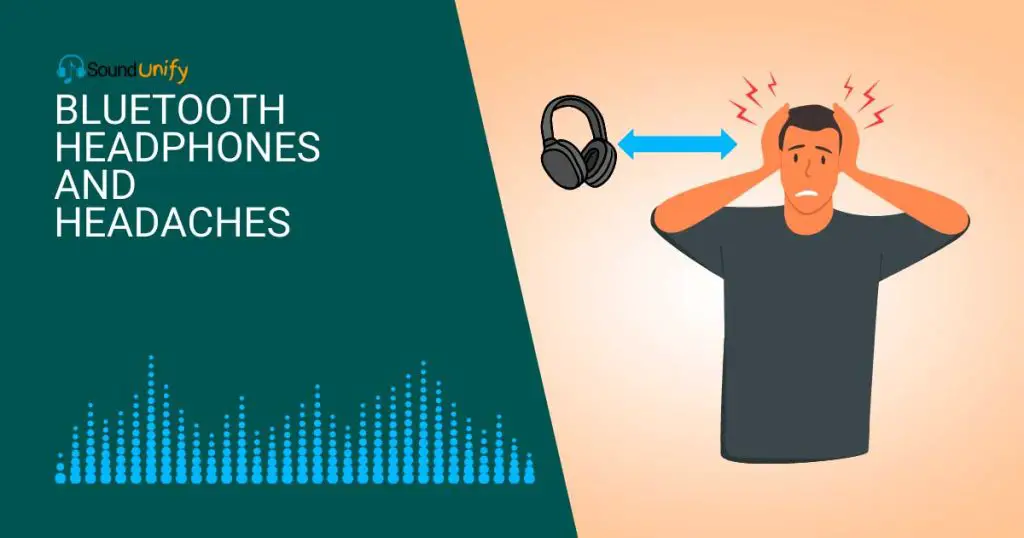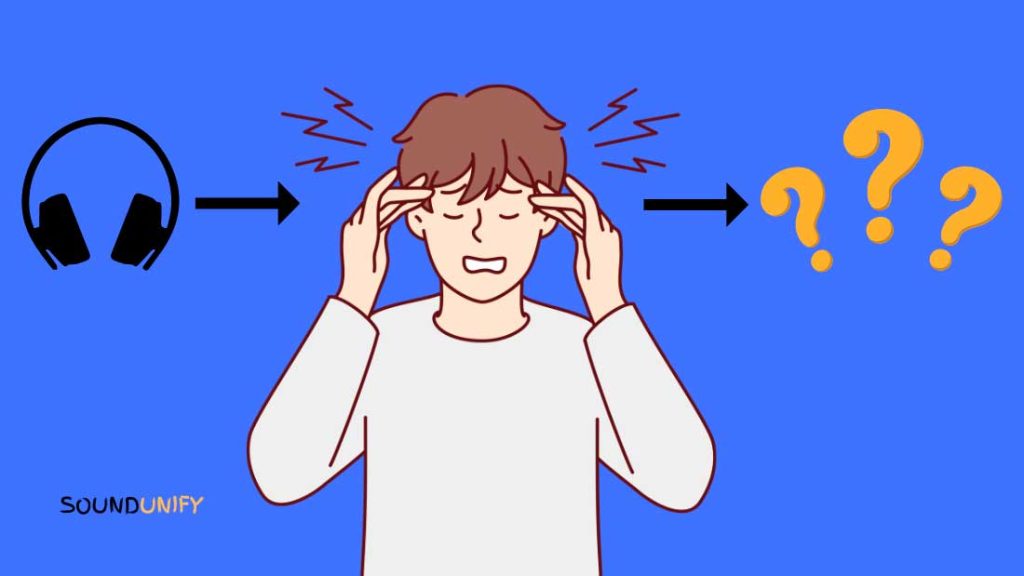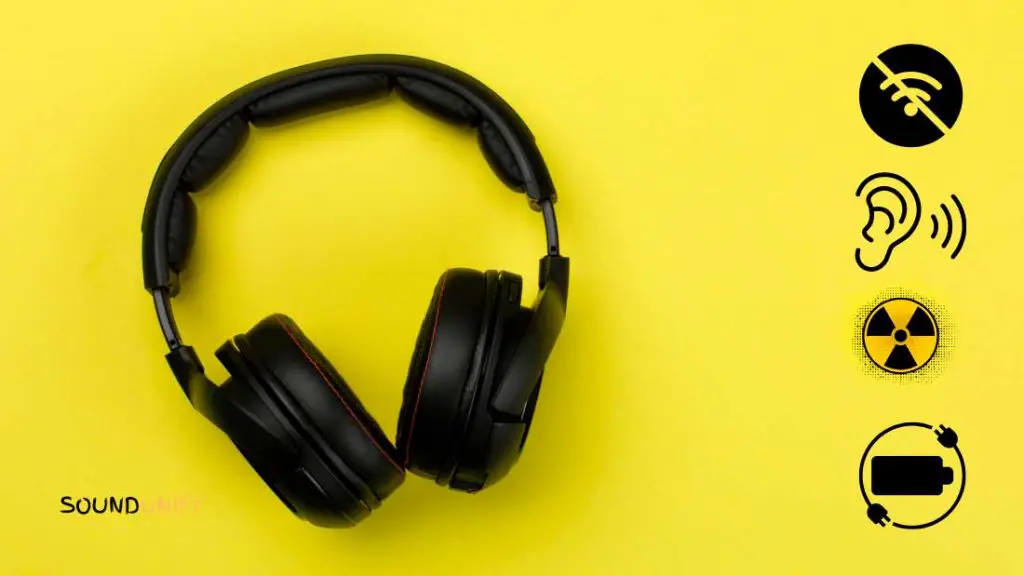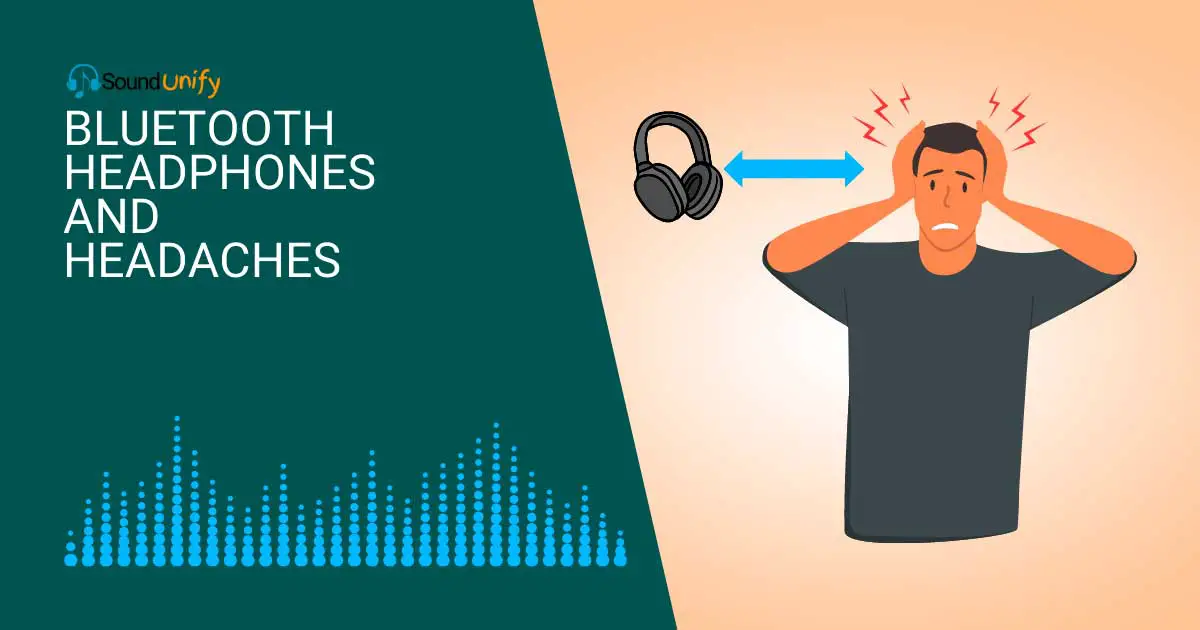Yes, Bluetooth headphones can cause headaches, but not for the reasons you might think. And yes, there are practical solutions to mitigate this discomfort.
Many folks suffer from headaches or other adverse effects after wearing wireless headphones. You could feel a vibration in your ears, unease around the temples, or even dizziness-like symptoms. There are a variety of reasons why you may be experiencing these issues.
Various factors may cause this:
- Including the proximity of the Bluetooth antenna to the head.
- Electromagnetic radiation emitted by the headphones.
- An improper fit.
In this article, we’ll explore the relationship between Bluetooth headphones and headaches and how to prevent them from happening in the future. We’ll also look at some of the best headphones that don’t cause headaches.
So you can enjoy your favorite tunes without worrying about the pain.
Can Wireless Headphones Cause Headaches?

The answer is yes – getting a headache from wearing Bluetooth headphones is possible due to their emitting electromagnetic radiation. While this radiation is not as intense as what’s emitted by cell phones, it can still cause headaches for some people.
These headaches can range in intensity from mild discomfort to quite severe pain. It’s important to note that everyone is different and will respond when exposed to various sound and electromagnetic radiation frequencies.
Therefore, paying attention is essential if you notice discomfort while using Bluetooth headphones.
Why Do Bluetooth Headphones Give Me A Headache?

Have you ever noticed that you have a headache after using your Bluetooth headphones? While blaming the headphones for the pain may be tempting, several potential causes could contribute to your discomfort.
1. Neurological Explanations
Neurological explanations for why Bluetooth headphones give you headaches include the increased stimulation of your auditory nerve. as well as the ability of sound waves to travel directly through your skull bone and into your brain.
When you use headphones with a wired connection, the sound must pass through multiple layers of tissue before reaching your auditory nerve. This extra tissue acts as a filter that decreases the sound’s intensity before going to your hearing nerve.
However, Bluetooth headphones send the sound directly to your ear canal without passing through any other tissues or structures. This means that the intensity of the sound is higher than it would be with a wired connection. And can cause greater stimulation of your auditory nerve, leading to headaches.
2. Design Issues
The main issue is the size and shape of the headphones. If they’re too small or don’t fit your head correctly, they can press on pressure points, leading to headaches. Another design issue is the weight of the headphones.
If it’s too heavy for your head, it may cause pain. Some ear cups are designed to protect your ears from outside noise, but if they press against your ears too hard, this can lead to throbbing headaches.
The material used to make the headphones can also affect how comfortable they feel on your head. Leather and memory foam usually provide a more comfortable experience than plastic or other materials that don’t adjust as well to different heads and ears.
3. EMF Radiation Concerns
EMF radiation, known as Electromagnetic Field radiation, is a form of energy that can be emitted from wireless devices like Bluetooth headphones. It has been suggested that prolonged exposure to EMF radiation may cause headaches in some people.
The level of EMF radiation associated with Bluetooth headphones is generally considered low, and studies have not found any significant link between it and headaches.
However, some people are more sensitive to EMF radiation than others, so specific individuals may get headaches from wearing Bluetooth headphones for extended periods.
4. Poor Power Management
Bluetooth headphones are designed to be completely wireless, but this convenience can come at a price. Power management of your Bluetooth device can lead to headaches for some users.
Power management is how a device controls energy consumption to save battery life. In Bluetooth headphones, this is typically done by limiting how much time the device can spend searching for a connection and streaming music. Suppose this time limit is not set correctly.
In that case, it could lead to an interruption in playback or an inconsistent connection that could cause headaches due to the user’s frustration with the situation.
5. Long Listening Sessions
When engaging in long listening sessions with Bluetooth headphones, users may experience a headache due to prolonged exposure to sound.
Prolonged exposure to loud noise can create physical pain for some people, particularly those sensitive to specific frequencies.
Orientation to sound at higher decibels can cause discomfort in the head and neck area, leading to headaches.
6. Poor Fit and Design
When wearing Bluetooth headphones, it’s essential to ensure they are fitted correctly. If headphones are too loose or heavy, they can cause discomfort in the ears and neck area, leading to headaches over time.
Similarly, if the ear cups are too tight or small, they may press into your head too firmly and cause headache-inducing pressure points.
Additionally, headphones with too much bass or treble can create an uncomfortable listening experience and contribute to headaches.
7. External Factors
External factors such as stress, dehydration, and fatigue can contribute to headaches after using Bluetooth headphones. Before switching off Bluetooth and listening with wired headphones, try to assess and address the root cause of your headaches.
What Are The Side Effects Of Using A Bluetooth Headset?

Bluetooth headphones are becoming more popular for people who want to enjoy their music without getting tangled up in cords. They offer the convenience of wireless listening, but there are many downsides that some people experience.
1. Interference
Other devices can interfere with or disrupt the signal when using Bluetooth headphones. This could lead to sound distortion or even dropped connections between the headphones and the paired device.
2. Ear Infections
Using Bluetooth headphones for extended periods can raise the risk of ear infections. Without the need for thick wires that press against the ears, moisture can build up and make the inner ears more prone to infection.
3. Poor Audio Quality
Bluetooth headphones offer poor sound quality than wired headphones. Bluetooth may compress the audio signal, making it sound flat and distorted.
4. Radiation Risk
Bluetooth headphones emit wireless radiation, which is considered harmless in most cases. Some rare occasions, people have reported headaches or dizziness after using Bluetooth headphones for extended periods.
5. Battery Life
For Bluetooth headphones to work, they must have a battery. And as with any storm, there is always the risk of dying in the middle of a listening session.
6. Potential Leaks
Bluetooth signals can pass through walls, meaning anyone on the other border could listen to your music. This could be a security risk, as the audio leakage can be used to gain entry into your home.
7. Discomfort
Bluetooth headphones typically have a smaller fit than wired ones, which can be uncomfortable for people with larger heads. Additionally, the smaller size of Bluetooth headphones means they are less secure, which could result in them falling off or slipping out during physical activities.
How To Prevent Bluetooth Headphones From Causing Headaches?

Headaches can be a real nuisance, sometimes caused by our headphones. If you are suffering from headaches while using Bluetooth headphones, there are some steps you can take to help prevent them.
1. Make sure your Bluetooth connection is solid and secure.
Poor connections or connections that keep dropping out can cause headaches due to constant sound interruption. Limit the time you spend wearing the headphones. Prolonged headphone use is linked to an increased risk of headaches from wired and wireless headphones.
2. Try adjusting your headset’s fit.
Ensure the ear pads cover your ears adequately, as this will reduce any pressure points that could lead to a headache. Also, ensure that the headset isn’t too tight or loose; if it’s too tight, it could put extra strain on your head, leading to headaches.
Similarly, if it’s too loose, it won’t provide enough support and might cause discomfort in other parts of your head, such as the temples or forehead.
3. Reduce the power output.
Many devices today can output a higher audio level than necessary. This can often cause headaches due to the higher decibel levels reaching our ears. Turn the volume down to a comfortable level to reduce the risk of headaches.
4. Invest in noise-canceling headphones.
Noise-canceling headphones reduce overall sound levels and increase comfort. They can also help reduce the risk of headaches by cutting out background noise and allowing for a more peaceful listening experience.
5. Consider taking regular listening breaks.
We often forget that our ears need a break too. Listening breaks of no more than 15 minutes can help to reduce the buildup of sound in our ears and reduce the risk of headaches.
By following these tips, you can help to reduce the risk of experiencing headaches when using Bluetooth headphones.
Remember, everyone's body and listening habits are unique, so paying attention to any signs that your headphones might be causing discomfort is essential. Take a break from using your headphones or switch to a wired connection if you notice any pain.
4 Best Headphones That Don’t Cause Headaches
If you’re like many people, you may have experienced headaches after using Bluetooth headphones. While the discomfort can range from minor to severe, it’s always best to take steps to prevent this issue from arising in the first place.
Luckily, several different types of headphones on the market won’t cause headaches, so if you want to avoid this problem, check out these options.
1. Apple AirPods Pro:
For those looking for headphones that won’t cause headaches, the Apple AirPods Pro is a great choice. They are comfortable and lightweight with a secure fit and feature active noise cancellation technology to eliminate unwanted outside noise. Plus, the sound quality is top-notch.
2. Bose QuietComfort 35 II:
The Bose QuietComfort 35 II also offers an excellent listening experience without causing headaches. They feature noise-canceling technology and are designed to be comfortable and lightweight. Plus, they offer up to 20 hours of wireless listening time, so you can jam out for hours on end without worrying about headaches.
3. Sony WH-1000XM3:
These headphones have a unique design that molds to the shape of your head, so they won’t cause any pressure points that could lead to headaches. They also provide excellent sound quality and active noise cancellation technology to enjoy your favorite tunes without discomfort.
4. Sennheiser Momentum Wireless:
The Sennheiser Momentum Wireless headphones are designed to be comfortable, lightweight, and noise-canceling. The memory foam earpads provide a snug fit, and the headphones feature an impressive battery life of up to 30 hours. They also come with a hard carrying case for easy storage and portability.
FAQs
Why do headphones give me a headache?
Headphones might give you a headache due to the pressure on your head and ears, the loud volume, or the type of sounds being played. Prolonged use can also strain your ears and cause tension headaches.
What can cause headaches?
Various factors, including stress, tension, dehydration, lack of sleep, diet, eye strain, and certain medical conditions can cause headaches.
Why do earbuds give me a headache?
Earbuds may cause a headache due to inserting them into the ear canal, potentially causing pressure or irritation. Listening to music at a high volume or for an extended period can also contribute to headaches.
How to wear Bluetooth headset?
To wear a Bluetooth headset, insert or place the earpiece in or over your ear, ensuring it’s snug and comfortable. Ensure the microphone (if present) is positioned close to your mouth and that the device is paired with your smartphone or computer.
Why do noise-cancelling headphones give me a headache?
Noise-canceling headphones might cause headaches for some people due to the pressure changes or vibrations created by the noise-canceling technology or the tight fit and prolonged use.
Why does my head hurt after using AirPods?
Your head might hurt after using AirPods due to the in-ear design, which can exert pressure on the ear canal, or due to listening at high volumes. Prolonged use without breaks can also strain your ears and cause headaches.
What is the solution for a headache?
Solutions for a headache can include resting in a dark, quiet room, applying a cold or warm compress to your head or neck, taking over-the-counter pain relief like ibuprofen or aspirin, staying hydrated, and avoiding headache triggers.
What causes Bluetooth interference?
Other nearby electronic devices can cause Bluetooth interference, physical obstacles like walls or furniture, wireless signals (like Wi-Fi routers), and devices using the same frequency band (2.4 GHz).
What color noise is best for headaches?
Pink noise, which is more profound and less harsh than white noise, is often considered best for headaches as it can provide a consistent and soothing sound environment, potentially helping to distract from or alleviate headache pain.
Conclusion
Bluetooth headphones can cause headaches and other side effects. Depending on your ears, some headphones may be better or worse for you than others. If you experience headaches from Bluetooth headphones,
- it’s best to take a break and switch back to regular wired headphones.
- You should also limit your exposure to loud sounds to avoid further damage to your hearing or potential headaches.
- There are several types of Bluetooth headsets available that don’t cause headaches.
If you want to enjoy the convenience of wireless audio without the discomfort of a headache, consider trying out one of these models.
James Dimento is a Chief-in-Editor of SoundUnify. He is a headphone enthusiast and creative writer passionate about audio technology. He has three years of experience writing about headphones and sound quality and is responsible for creating reviews and taking care of all administration.
